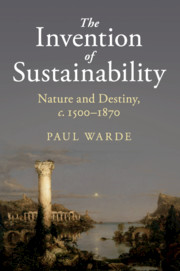Crossref Citations
This Book has been
cited by the following publications. This list is generated based on data provided by Crossref.
Szreter, Simon
2018.
Marx on Population: A Bicentenary Celebration.
Population and Development Review,
Vol. 44,
Issue. 4,
p.
745.
De Keyzer, Maïka
2019.
The impact of inequality on social vulnerability in pre-modern Breckland.
Journal for the History of Environment and Society,
Vol. 4,
Issue. ,
p.
71.
2019.
Bibliography.
International Review of Social History,
Vol. 64,
Issue. 1,
p.
165.
Bergquist, Ann-Kristin
2019.
Renewing Business History in the Era of the Anthropocene.
Business History Review,
Vol. 93,
Issue. 1,
p.
3.
Kreisel, Deanna K.
2019.
From Political Economy to Economics through Nineteenth-Century Literature.
p.
129.
Chakrabarty, Dipesh
2019.
The Planet: An Emergent Humanist Category.
Critical Inquiry,
Vol. 46,
Issue. 1,
p.
1.
Spary, E. C.
and
Zilberstein, Anya
2020.
On the Virtues of Historical Entomophagy.
Osiris,
Vol. 35,
Issue. ,
p.
1.
Goossen, Benjamin W.
2020.
A benchmark for the environment: big science and ‘artificial’ geophysics in the global 1950s.
Journal of Global History,
Vol. 15,
Issue. 1,
p.
149.
Haug, Sebastian
2020.
Türkeiforschung im deutschsprachigen Raum.
p.
93.
Estoque, Ronald
2020.
A Review of the Sustainability Concept and the State of SDG Monitoring Using Remote Sensing.
Remote Sensing,
Vol. 12,
Issue. 11,
p.
1770.
Anker, Peder
2020.
The Power of the Periphery.
2020.
Bibliographie.
Romantisme,
Vol. n° 189,
Issue. 3,
p.
96.
Kortekangas, Otso
2020.
The nomads, the settlers and the in-betweens: Nordic clergymen on Sámi livelihoods in the early nineteenth century.
History and Anthropology,
Vol. 31,
Issue. 4,
p.
510.
Loskutova, Marina
2020.
Quantifying scarcity: deforestation in the Upper Volga region and early debates over climate change in nineteenth-century Russia.
European Review of History: Revue européenne d'histoire,
Vol. 27,
Issue. 3,
p.
253.
Jönsson, Jimmy
Mårald, Erland
and
Lundmark, Tomas
2021.
The shifting society syndrome: Values, baselines, and Swedish forest conservation in the 1930s and 2010s.
Conservation Science and Practice,
Vol. 3,
Issue. 10,
Starlander, Jakob
2021.
Conflict and negotiation: management of forest commons in seventeenth-century Northern Finland.
Scandinavian Economic History Review,
Vol. 69,
Issue. 2,
p.
177.
Mårald, Erland
and
Priebe, Janina
2021.
Sustainability Metamorphosis.
Nature and Culture,
Vol. 16,
Issue. 2,
p.
1.
Miya, Chelsea
Rossier, Oliver
and
Rockwell, Geoffrey
2021.
Right Research.
Sörlin, Sverker
2021.
Nordic Perspectives on the Responsible Development of the Arctic: Pathways to Action.
p.
321.
Priebe, Janina
Mårald, Erland
and
Nordin, Annika
2021.
Narrow pasts and futures: how frames of sustainability transformation limit societal change.
Journal of Environmental Studies and Sciences,
Vol. 11,
Issue. 1,
p.
76.



